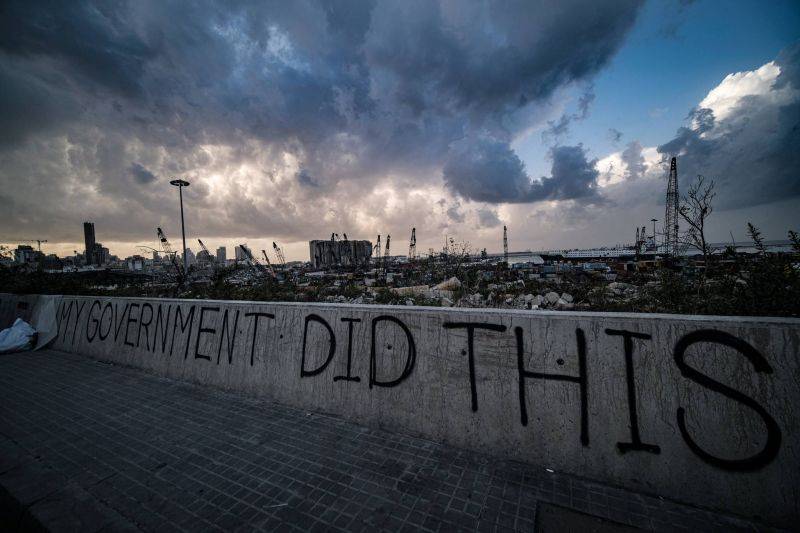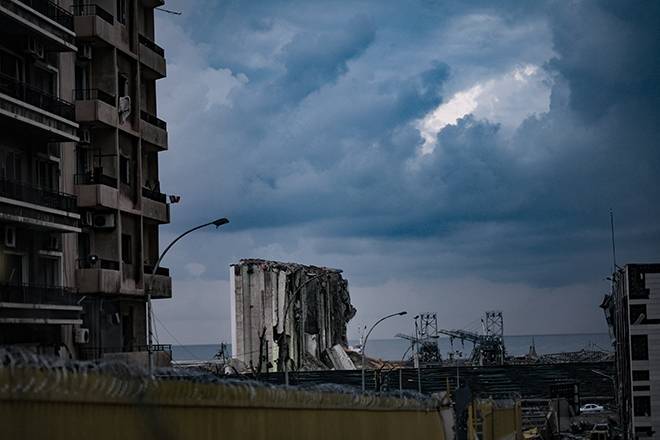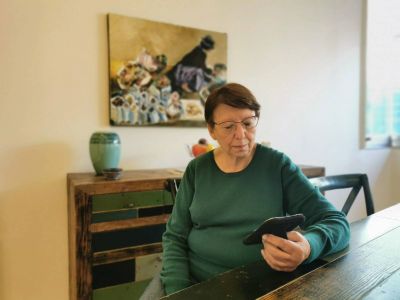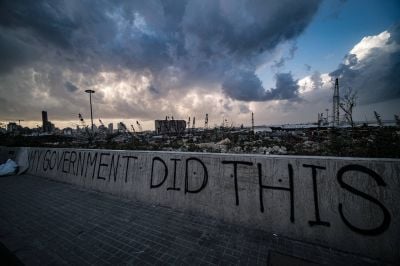
“My government did this,” reads writing on a low wall in front of the ruins of the Beirut port. (Credit: João Sousa/L’Orient Today)
What do Badri Daher, the customs director at Beirut’s port; Maj. Joseph Naddaf, the head of the port’s State Security office and the person who alerted authorities to the danger of the ammonium nitrate stored there; and Omar Raja, one of the workers who repaired the warehouse in which the chemical was stored, have in common?
All three were detained after the Aug. 4 Beirut port blast that killed more than 200 people, wounded thousands and ravaged much of the capital. But this is perhaps the only thing these three men share.
In reality, their roles, their responsibilities and their room for maneuver in this matter are incomparable.
The same goes for the 22 other people who remain behind bars. Yet Investigative Judge Fadi Sawwan, who was entrusted with the case, is holding them all in custody on the same assortment of charges, including intentional homicide. More than five months later, the specifics of each detainee’s charges remain unknown.
‘It was a roundup’
As if pulling a trawl net, Sawwan caught the big fish and the small ones, and all those other fish who happened to be in the wrong place at the wrong time.
Akram Maalouf, a lawyer, says it bluntly: “It was a roundup.”
Maalouf took up the case of Nayla al-Hage, the external technical inspector of the repair work in warehouse 12, who has been in custody since Aug. 7. “She asks me all the time why she is locked up there when she has not done anything,” he says. (Read her story in part two of this report.)
The case of Maj. Joseph Naddaf is also intriguing. In his May 2020 report, Naddaf raised red flags regarding the conditions of the ammonium nitrate’s storage at the port, which prompted the public prosecutor to start, for the first time, securing the premises where tons of the chemical had been stored for years.
Despite his efforts, this whistleblower was unable to prevent the explosion, and now wonders why he is being held.
“Joseph is going through difficult times. But he keeps telling himself that he had done everything in his power. He could not dispose of the ammonium nitrate himself,” says his wife Cynthia, who does not know what to tell their young children to justify their father’s prolonged absence.
Mounia, the wife of Charbel Fawaz, a General Security officer who works at the port, finds herself in the same situation. Fawaz and his colleague Daoud Fayad have been kept in custody, but do not know the reason for their detention.
“My husband maintains his innocence. He was summoned [for questioning] and he showed up convinced that he was innocent. I accompanied him there. Later, he informed me that he was arrested,” Mounia recounts.
These officers are responsible for checking the identity of people entering the port and writing reports to this effect. “They have nothing to do with the goods or the warehouses,” says Charles Ghosn, Fawaz’s lawyer.
“It is totally unfair to keep these people in detention,” says Fadi Haddad, who defends Salim Chebli, the contractor who carried out the repair works in warehouse 12, where tons of ammonium nitrate were stored.
Chebli’s family business has handled electrical maintenance at the port for about 30 years. Chebli and his three employees have been detained since speculation emerged that welding works were linked to the outbreak of the fire that caused the explosion.
But what about the port officials, such as port Director-General Hassan Koraytem, head of port security Mohammad al-Awf, and Daher’s predecessor as customs chief, Chafic Merhi?
How is their prolonged detention for investigation purposes justified?
“The difference lies in the prerogatives of the concerned parties. One could always argue that these [port] officials could have done more [to avert the tragedy] because they had more margin of maneuver — but the others did not,” Maalouf says.
A judge with unlimited powers and a stalled investigation
The Beirut port explosion case was referred in August to the Court of Justice, which is made up of the country’s top judges. It is a special court that deals with sensitive state crimes. During Syria’s hegemony over Lebanon, the Court of Justice tried Samir Geagea, the leader of the Lebanese Forces, who was accused of several assassinations, including that of Prime Minister Rachid Karami in 1987.
The Court of Justice’s decisions are not subject to appeal. However, no trial at this special court can begin before it has in hand the file of the investigative judge who collects evidence against the concerned individuals.
In the port explosion case, the investigative judge was chosen by the justice minister with the approval of the Higher Judicial Council. The investigative judge’s work is done in complete secrecy, and direct external communication with him is prohibited. The judge has broad powers, including the power to bring charges against and arrest ministers.
“He can do whatever he wants,” according to a source familiar with the issue. The judge can also choose to keep a person in custody indefinitely for the purposes of his investigation, and any request for release during the period can be refused without any possibility of appeal.
Normally, detention is set for two months, renewable once, for misdemeanors, and six months for felonies, according to Article 108 of the Code of Criminal Procedure.
This article, however, does not apply when the case is transferred to the Court of Justice. This means that suspects can be held in custody without trial for an indefinite period of time.
For example, Hannibal Gaddafi, one of the sons of former Libyan dictator Muammar Gaddafi, has languished in jail for five years, without being tried, in the case of the 1978 disappearance in Libya of Shiite religious leader Moussa al-Sadr.
“This is undoubtedly why MPs did everything to avoid being summoned,” quips a legal source in reference to a request from MPs and former ministers Ali Hassan Khalil and Ghazi Zeaiter, who have been charged with criminal negligence in the port case, to remove Sawwan from the probe.
The investigation process has slowed down since the recusal request was filed with the Court of Cassation. The detainees’ fate now hinges on the speed of the judicial procedure and the hurdles in the way of the probe.
“Don’t expect that the demands to remove Fadi Sawwan from his post will be limited to the verdict of the Court of Cassation,” warns the same source, who requested anonymity.
If the high court rejects the claims of the two Amal MPs, they can file another motion to remove Judge Sawwan, this time with the Court of Appeal, on suspected conflict of interests grounds: Sawwan, they may contend, is also a victim of the explosion as his Achrafieh apartment was damaged in the blast.
“The investigation will come to a halt, by simply filing this challenge,” says the source, adding that other senior officials summoned to appear before the investigative judge might follow in the footsteps of Khalil and Zeaiter, which would delay the probe’s progress until further notice.
A violation of human rights?
“We’ve reached a complete deadlock. The lawyers cannot do their job. All this can drag on for years. Even if my husband is innocent, I have no faith in this country. I know the worst can happen,” says Mounia Fawaz, wife of Charbel, who remains in custody at the General Security premises alongside his colleague Daoud Fayyad.
Naddaf is held at State Security, while 22 other detainees are at the Rihanieh military prison in Baabda.
Potentially innocent people could pay a high price if the investigation drags on, especially since there is no compensation if the individual is acquitted and released, regardless of the time they have spent in prison.
“This is where the great injustice lies,” says Maalouf, Nayla al-Hage’s lawyer. Meanwhile, Geralda al-Hage, the mother of the imprisoned 42-year-old engineer, laments, “Who will pay for the moral damages to my daughter if her life is wasted after this detention?”
 The silos at the Beirut port were heavily damaged by the explosion on Aug. 4. (Credit: João Sousa/L’Orient Today)
The silos at the Beirut port were heavily damaged by the explosion on Aug. 4. (Credit: João Sousa/L’Orient Today)
The scale of the human and material losses, as well as the emotional toll of the Aug. 4 tragedy, have naturally turned the spotlight on the victims of the blast and their families, and the absolute need to identify the culprits and hold them accountable.
But according to Human Rights Watch, arrested individuals have the right to be informed in detail about the charges they face, in order to be able to fully understand those charges and prepare their defense, whatever the nature of the crime.
“Lengthy pretrial detention also violates due process rights guaranteed under international law. Anyone who is remanded in custody has the right to a trial within a reasonable [amount of] time, or be released,” says Aya Majzoub, the Lebanon researcher at Human Rights Watch.
Although according to Article 363 of the Lebanese Code of Criminal Procedure, the Court of Justice is exempt from setting a pretrial detention time limit, Majzoub argues that several provisions of the law are in violation of international legal norms mentioned in treaties to which Lebanon is a signatory. These norms take precedence over national law, according to Article 2 of the Civil Code.
“Lebanon cannot invoke its provisions of domestic law to justify violating international treaties it has ratified,” she says.
For her part, Caretaker Justice Minister Marie-Claude Najm says that although she is generally not in favor of special courts, notably when these do not allow ordinary appeal processes, she pushed for this case to be referred to the Court of Justice instead of the Military Tribunal.
“What mattered most to me was that victims could be involved in the proceedings as plaintiffs and civil parties, which would not have been possible at the Military Tribunal,” Najm explains.
She goes on to say that “at the Military Tribunal, the victims would have been excluded from the trial and would have had to wait for a final and irrevocable judgment to be rendered before they could seek compensation in civil courts. On the contrary, the Court of Justice allows victims, from the very beginning of the investigation, to take part in the proceedings, make claims and attend the interrogations of the defendants.”
Najm does not hide her concerns that the investigative judge will not be able to proceed with his work calmly and that the investigation will be interrupted. In the event that the Court of Cassation decides to dismiss Sawwan, she will have to appoint another investigative judge with the approval of the Higher Judicial Council. In this case, this matter needs to be settled swiftly so that the probe can be resumed.
If Sawwan is removed, it may prove challenging to find another judge willing to take on a high-profile case of huge importance to a population on edge and thirsty for justice.
A source familiar with the case says that one of the judges initially chosen — that is, before Sawwan’s appointment — turned down the post “for fear of disappointing the Lebanese.”
According to sources close to the case, it appears that the defendants will only be tried for “misdemeanor manslaughter” — an offense whose punishment is not proportional to the scale of the human and material losses, incurring sentences ranging from six months to three years in prison.
* * *
The names of the detained
Customs officials, under the Finance Ministry:
Badri Daher, director-general
Chafic Merhi, former director-general
Nehme Brax, director of the manifest department
Hanna Fares, port office director
Khaled al-Khatib, staff sergeant
Elias Chahine, staff sergeant
Port officials and others under the Ministry of Public Works and Transportation:
Abdel Hafiz El-Kayssi, director-general of maritime transport
Hassan Koraytem, port director-general
Mohammad al-Mawla, harbor master
Mohammad al-Awf, head of security
Samer Raad, engineer and head of operations
Moustapha Farchoukh, head of the merchandise department
Michel Nahoul, project director
Mikhael Murr, employee
Johnny Gerges, employee
Wajdi al-Karkafi, employee
Security agency officials at the port, under various administrations:
Army Brig. Gen. Antoine Salloum
General Security Maj. Daoud Fayad
General Security Maj. Charbel Fawaz
State Security Maj. Joseph Naddaf
External service providers:
Nayla al-Hage, engineer and technical inspector
Salim Chebli, head of the electrical maintenance company in charge of the works at warehouse 12
Ahmad al-Rajab, Chebli employee
Khodr al-Ahmad, Chebli employee
Raed al-Ahmad, Chebli employee
This article is the first in a two-part series. Find part two here. The series was originally published in French. Translation by Sahar Ghoussoub.
Editor’s note: This article has been amended from its originally published translation to more precisely describe the legal details of the case in English. Most significantly, the term “indictment” has been replaced to avoid any potential confusion; initial charges have been brought against the detainees, but no accusatory decision has been made. Nayla al-Hage’s job description has also been altered to more accurately reflect her duties at warehouse 12.


